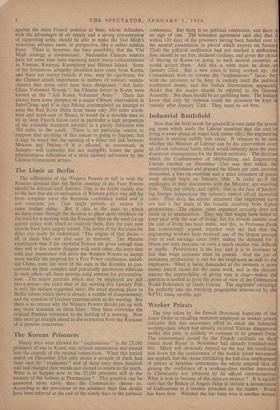Ninety days were allowed for " explanations " to the
23,000 prisoners of war in Korea who refused repatriation and passed into the custody of the neutral commission. When this period ended on December 23rd only about a seventh of them had been seen by " explainers " and of these only three hundred odd had changed their minds and elected to return to the north. What is to happen now to the 22,500 prisoners still in the custody of the Indians at Panmunjom ? This question can be answered more easily than the Communists choose to. According to the provisions of the armistice their fate should have been referred at the end of the ninety days to the political conference. But there is no political conference, and there is no sign of one. The armistice agreement said also that if within 120 days of the prisoners having been handed over to the neutral commission (a period which expires on January 22nd) the political conference had not reached a settlement, they should be set free, declared civilians, and given the choice of staying in Korea or going to such neutral countries as would accept them. And this is what must be done on January 22nd. But a new crisis is being worked up: the Communists wish to resume the. "explanations " farce; they wish the prisoners to be kept in custody until the political conference meets; and the Indian Government apparently thinks that the matter should be referred to the General Assembly. But there should be no quibbling here. The Indians know that only by violence could the prisoners be kept in custody after January 22nd. They must be set free.










































 Previous page
Previous page